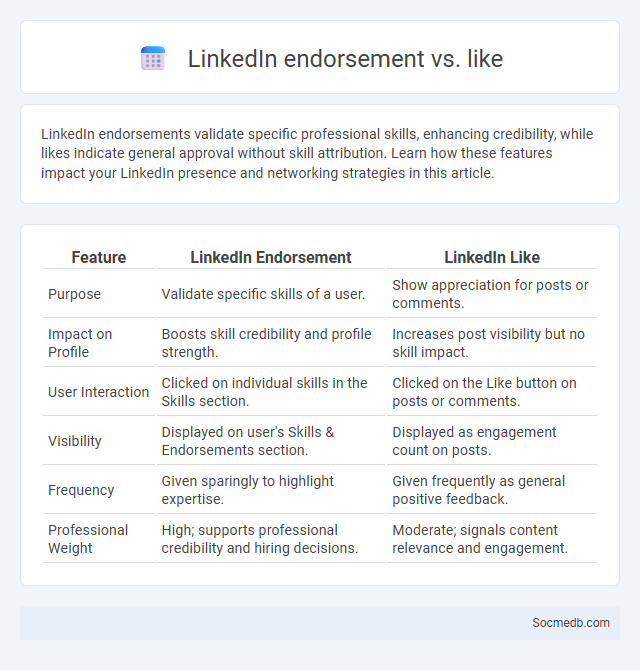
Photo illustration: LinkedIn Endorsement vs Like
LinkedIn endorsements validate specific professional skills, enhancing credibility, while likes indicate general approval without skill attribution. Learn how these features impact your LinkedIn presence and networking strategies in this article.
Table of Comparison
| Feature | LinkedIn Endorsement | LinkedIn Like |
|---|---|---|
| Purpose | Validate specific skills of a user. | Show appreciation for posts or comments. |
| Impact on Profile | Boosts skill credibility and profile strength. | Increases post visibility but no skill impact. |
| User Interaction | Clicked on individual skills in the Skills section. | Clicked on the Like button on posts or comments. |
| Visibility | Displayed on user's Skills & Endorsements section. | Displayed as engagement count on posts. |
| Frequency | Given sparingly to highlight expertise. | Given frequently as general positive feedback. |
| Professional Weight | High; supports professional credibility and hiring decisions. | Moderate; signals content relevance and engagement. |
Understanding LinkedIn Engagement: Endorsements vs Likes
LinkedIn engagement is driven mainly by endorsements and likes, each serving distinct purposes in professional networking. Endorsements validate specific skills, boosting credibility and attracting recruiters, while likes signal general approval, increasing post visibility and reach across connections. Effective LinkedIn strategies balance endorsements to enhance profile strength with likes to amplify content engagement.
What is a LinkedIn Endorsement?
A LinkedIn endorsement is a feature that allows users to recognize and validate your specific skills and expertise on your professional profile. Endorsements from colleagues, clients, or industry peers enhance your credibility and increase the visibility of your abilities to potential employers or business connections. Receiving strategic endorsements strengthens Your professional brand and improves search results within LinkedIn's algorithm.
The Role of Likes on LinkedIn
Likes on LinkedIn significantly influence content visibility and professional credibility by boosting algorithmic promotion and signaling peer endorsement. Engagement metrics such as likes increase post reach, enhancing networking opportunities and fostering trust among industry professionals. Analyzing like patterns helps optimize content strategy, driving targeted audience interaction and strengthening personal or corporate branding.
Endorsement vs Like: Key Differences
Endorsement on social media signifies a stronger level of approval by publicly supporting or recommending content, brand, or individual, often influencing your audience's trust and decisions. Likes simply indicate a user's positive reaction or agreement without a deeper commitment or promotion. Understanding the distinction helps you gauge engagement quality and tailor your marketing strategies effectively.
How LinkedIn Endorsements Impact Your Profile
LinkedIn endorsements enhance your profile by showcasing specific skills verified by peers, increasing your credibility in your professional network. These endorsements improve your visibility in search results, making it easier for recruiters and potential clients to find you. Your profile becomes more attractive and trustworthy, influencing opportunities for career growth and business connections.
Benefits of Receiving Likes on LinkedIn Posts
Receiving likes on LinkedIn posts enhances professional visibility by increasing post reach within relevant industry networks. Likes serve as social proof, boosting credibility and attracting potential employers, clients, or collaborators. Engaged posts with higher like counts are favored by LinkedIn's algorithm, leading to greater opportunities for networking and career growth.
Endorsement vs Endorsement: Clarifying the Terms
Endorsement in social media refers to a public declaration of support or approval by influencers, brands, or users, often involving paid promotions or product recommendations. Clarifying the terms distinction is essential as explicit endorsements are regulated by advertising guidelines, requiring transparency, while informal endorsements might occur organically without compensation. Your understanding of these differences ensures compliance and builds authentic engagement in digital marketing strategies.
Which is More Valuable: Endorsements or Likes?
Endorsements hold greater value than likes in social media because they signify trust and influence, directly impacting brand reputation and consumer decisions. Likes measure engagement but often reflect passive approval, while endorsements, such as testimonials or influencer promotions, drive authentic connections and conversion rates. Understanding this distinction helps you leverage social proof effectively to enhance your online presence and credibility.
Optimizing Your LinkedIn Strategy: Balancing Endorsements and Likes
Optimizing your LinkedIn strategy involves balancing endorsements and likes to enhance professional credibility and network visibility. Endorsements from colleagues highlight your specific skills, boosting your profile's search ranking and attracting recruiters. Meanwhile, accumulating likes on posts increases engagement metrics, expanding your reach and fostering industry connections.
Best Practices for Increasing LinkedIn Engagement
Consistently sharing valuable, industry-relevant content tailored to your LinkedIn audience drives higher engagement and builds your professional brand. You can boost interaction using clear calls-to-action, engaging visuals, and timely responses to comments and messages. Leveraging LinkedIn analytics to refine posting times and content types maximizes your reach and fosters meaningful connections.
 socmedb.com
socmedb.com